中考英语易错知识点归纳
- 格式:doc
- 大小:31.50 KB
- 文档页数:3

1.宾语从句:1.主句若是一般现在时,从句根据实际情况用适当时态。
He says (that) he will have a walk soon.The teacherasks who is the cleverest in the school.I want to know who came here late this morning.2.主句若是一般过去时,从句也要用过去时。
He wondered if I would come. She told me that her son had got well.She said that she liked watching TV. We thought Jim was wrong.3.无论主句是何时态,从句若表客观真理,要用一般现在时。
Mr. Li said the moon is smaller than the earth.4宾语从句无论有何引导词,都要用陈述句语序。
Could you tell me when you will get back to Wuhan?(不是will you)Do you know which sweater she is wearing? (不是is she)2.状语从句:1主句若是一般将来时、祈使句或含不表过去的情态动词等,则if(如果), unless(除非),when(当…的时候), as soon as(一…就…),before, after, until, till, as(当…的时候)所引导的状语从句用一般现在时。
You may take a rest when you finish doing your work.I will call you up if I leave for Shanghai next week.Wait for your brother at the bus station until he arrives.2而主句若是一般过去时,从句也要用过去时,如:I would give the money to the charity if I had a million dollars.When he got to the park, his classmates had left.My son ran towards me as soon as he saw me on the street.3.定语从句:关系代词who只指人,which只指物。
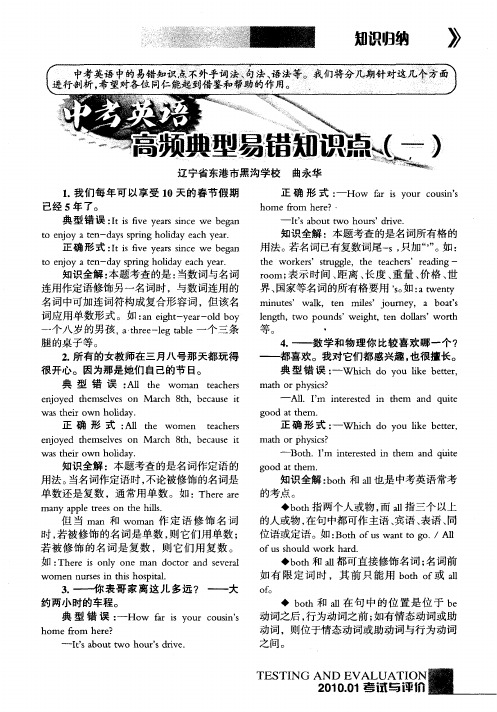

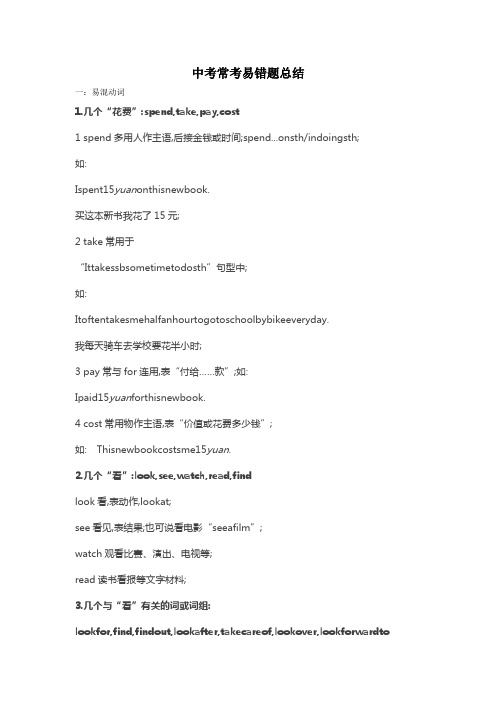
中考常考易错题总结一:易混动词1.几个“花费”:spend,take,pay,cost1 spend多用人作主语,后接金钱或时间;spend...onsth/indoingsth;如:Ispent15yuan onthisnewbook.买这本新书我花了15元;2 take常用于“Ittakessbsometimetodosth”句型中;如: Itoftentakesmehalfanhourtogotoschoolbybikeeveryday.我每天骑车去学校要花半小时;3 pay常与for连用,表“付给……款”;如:Ipaid15yuan forthisnewbook.4 cost常用物作主语,表“价值或花费多少钱”;如:Thisnewbookcostsme15yuan.2.几个“看”:look,see,watch,read,findlook看,表动作,lookat;see看见,表结果;也可说看电影“seeafilm”;watch观看比赛、演出、电视等;read读书看报等文字材料;3.几个与“看”有关的词或词组:lookfor,find,findout,lookafter,takecareof,lookover,lookforwardtolookfor寻找,表过程;find发现,找到,表结果;findout找出,查明;lookafter,takecareof均表示“照看,照顾”;lookover检查、翻阅等;lookforwardto盼望……,期待……;4.几个“说”:say,speak,talk,tell1 say用作及物动词或不及物动词;用作及物动词时,侧重说的内容;say用作不及物动词时,不涉及所说的内容;如:PleasesayitinEnglish.这个请用英语说;It'shardtosay.很难说;Easiersaidthandone.说起来容易,做起来难;say之后通常跟直接引语、间接引语或宾语从句;如:Theteachersaid,“Pleaselookatme.”老师说:“请看着我”; Ourteachersaidthattheearthgoesaroundthesun.老师说地球围绕太阳运行;含有say的固定搭配和常见的句型有:saytooneself自言自语;say“Hi/Hello”tosb.向某人问好;havenothingtosayto对……无话可说;sayagoodwordforsb.为某人说好话;Theysay.../It'ssaid...据说……;Thatistosay那就是说;2 speak常指能说某种语言,打电话时常用它表示说话,也有“演讲”的意思,不强调说话的内容;如:WecanspeakChineseandEnglish.我们可以说汉语和英语;MayIspeaktoHenry我可以和亨利讲话吗Hewillspeakatthemeetingtonight.他将在今晚的会议上发言;3 talk用作不及物动词,作“说话”讲时与speak可以互换使用;作“交谈”讲时,通常与介词to/with连用;如:Thebabycan'ttalkyet.那个婴儿还不会讲话;TheyoftentalkinEnglish.他们经常用英语交谈;I'dliketotalktoher.我想和她谈一谈;talk用作名词时,可以与动词have一起构成短语“haveatalkwith”,意思是“和……谈一谈”;如:MayIhaveatalkwithyou我可以和你谈一谈吗含talk的短语、固定搭配和句型常见有:talkto/withsb.和某人谈话;talkabout谈论;haveatalkwithsb.和某人谈话/谈一谈;talkof谈到/讲到;talkout说完4 tell用作及物动词,意思是“讲、说”,指说实话,说出事实的真相,讲故事等;如: Mymotheroftentellsmestories.妈妈经常给我讲故事;Pleasetellmethetruth.请告诉我事实的真相;Theboynevertellslies.那个孩子从不说谎;NobodycantellhowthePyramidswerebuilt.没有人能说出金字塔是怎样建成的;tell表示命令时,作“叫、告诉”讲,常见的句型是“tellsbtodosth.”,意思是“叫/告诉某人做某事”;如:Tellhimtocometomyoffice.叫/告诉他到我的办公室来;Tellthemnottolookoutofthewindow.叫他们不要向窗外望;含有tell的短语、固定搭配和常用句型有:tellsb.astory给某人讲故事;tellsb.aboutsth.告诉某人关于某事的情况;tellsb.todosth.叫某人做某事;tellalie说谎;tellthetruth说实话;5.几个“穿,戴”:puton,wear,dressupputon指“穿上、戴上”,强调动作,代词放在中间;wear指“穿着,戴着”,表示状态;dress指“给某人穿衣服”,其宾语是人;dressup指“穿上盛装,打扮”;6.几个“到达”:reach,arrivein/at,gettoreach是及物动词,它后面可以直接跟表示地点的名词作宾语;arrive是不及物动词,后面接表示地点的名词作宾语时需在宾语前加介词in或at在国家和较大的城市或地区前用in,较小的地方或单位前用at;getto表示到达,多用于口语中;注意:当表示到达here,there,home时,arrive或get后不要加介词;7.几个“带、拿”:bring,take,get,carrybring指将某物或某人从离说话人较远处“拿来”或“带来”;take指将某物或某人从离说话人较近处“带到”或“拿到”;get指从说话人所在位置到别处把某物拿来;carry不强调动作来去的方向,只说明动作方式,表示“背着、扛着、提着、载着”等含义;8.几个与“听”有关的词或词组:listento,hear,hearof,hearfromlistento听……,表示听的动作;hear听见,听到,表示结果;hearof听说……;hearfrom收到某人的信息或来信;9.beat和winbeat表示“赢”或“打败”,后面要接被打败的对手;win用作及物动词时,后面接的不是被打败的对手,而是比赛本身、游戏、战争、名次等;10.rise和raiserise是不及物动词,表示“上升、提高、增长”等;raise是及物动词,表示“举起、抬起”;11.borrow,lend和keepborrow指其逻辑主语从别处或别人那里“借来”东西,常与介词from连用;lend指其逻辑主语将东西“借出、借给”别人,常与介词to连用;keep表示“保存”,与表示一段时间的时间状语连用;12.receive和acceptreceive的意思是“收到了……”,只表示收到某物,并不表明同意或不同意接受的含义;accept表示“接受……”,“同意接纳……”,如接受物体、邀请、批评等;如: Hereceivedaninvitationfromherandacceptedithappily.他收到了她的邀请,并且很愉快地接受了;13.answer与replyanswer意为“回答、响应、答复、接听电话”等,多作及物动词;reply意为“回答、答复”,是不及物动词,后需加介词to,at等再加宾语;14.wish,hope与expecthope指主观上的愿望,但在客观上不一定有实现的可能性,常接that从句、动词不定式或以介词for引出的短语;expect着重指客观上有可能实现的“期待、期望”等,其后可接名词、代词、动词不定式或that从句;Wish sb to do sth15.lie和laylie有多个意思:表示“躺;位于”时,其变化是lay,lain,lying;表示“说谎”时,其变化是lied,lied,lying;lay的含义是“放置、产卵”等;其变化是laid,laid,laying;二:现在完成时与一般过去式的区别它们所表示的动作都发生在过去,但二者又有区别:一般过去时表示过去某个时间发生的事、存在的状态或经常发生的动作,说话的侧重点在于陈述一件过去的事情,与现在没有关系;现在完成时表示与现在有关系的发生在过去的动作,它不与表示明确过去时间状语如yesterday,lastweek,amomentago等连用;如:—ThesefarmershavebeentotheUnitedStates.——这些农民去过美国了;—ReallyWhendidtheygothere——真的吗他们什么时候去的—Haveyoufinishedyourhomework——你完成作业了吗—Yes,Ididitamomentago.——是的,我刚刚做的;三:常考词组A 词组have/hasbeenin/to与have/hasgoneto的区别“have/hasgoneto+地点”表示“某人去了某地还未回来”,指主语所指的人不在这儿;“have/hasbeenin+地点”表示“在某地呆了多长时间”,常与表示时间段的状语连用;“have/hasbeento+地点”表示“曾经去过某地但现在已不在那儿”;如: Myfatherisn'tathome.HehasgonetoBeijing.我爸爸不在家,他去北京了;IhavebeeninBeijingfor10years.我待在北京十年了; Ihavebeentothatcity,andIdon'twanttogothereagain.我去过那座城市了,我不想再去了;B wouldrather与preferto1 wouldrather相当于一个情态动词,后面跟不带to的动词不定式构成句型:wouldratherdosth.,意为“宁可/愿做……;”其否定结构为:wouldrathernotdosth.,意思是“宁可/愿不做……”;如: Theywouldratherusecolorslikeorangeandyellow.他们宁愿使用像橙色和黄色这样的颜色;I'drathernottellyouaboutit.关于这件事我不愿告诉你;wouldrather与than连用时,than前、后连接两个平衡结构,意为“宁愿……而不愿......;与其……不如……;”如:I'drathergoshoppinginSunshineTownthaninMoonlightTown.我宁愿去阳光城购物,也不愿去月光城;I'dratherputthepictureonmyhomepagethanshowittoeveryone.我宁愿把照片放在家庭网页上,而不愿把它给每个人看;2动词prefer用作及物动词时,之后通常跟名词/动名词作宾语,再加to加名词/动名词,即“preferAtoB”结构,意为“喜欢A胜过B;宁愿A不愿B”;如: IprefermoderndramatoBeijingOpera.我喜欢话剧胜过京剧; Ipreferwalkingtojogging.我宁愿散步而不愿慢跑;有时“preferdoingsth.todoingsth.”结构可以与“wouldratherdosth.thandosth.”结构互换使用;如:Iprefersingingtodancing.我宁愿唱歌不愿跳舞;=I'drathersingthandance.注意:“preferAtoB”与“preferAratherthanB”有时可以互换使用;如:Ipreferfishtochicken.我宁愿吃鱼不愿吃鸡;该句相当于:Ipreferfishratherthanchicken.四:瞬间动词与延续性动词的区别瞬间性动词表示短暂的、不能持续一段时间的动作,如:come,leave,begin,become,buy,receive,die,join,borrow,lend,go等;瞬间性动词不能与表示一段时间的状语连用;持续性动词表示能持续一段时间的动作,如:work,stay,live,learn,read,write,wait等,可以与表示一段时间的状语连用;例如:她已经离开沈阳一个月了;误:ShehasleftShenyangforamonth.正:ShehasbeenawayfromShenyangforamonth.但是瞬间动词的否定结构可以与表示一段时间的状语连用,说明某动作不发生的状态可以持续一段时间;如:Sheoftengoesonbusiness.Butshehasn'tleftShenyangforamonth.她经常出差办事,但她已经一个月没离开沈阳了;提分策略英语动词的“时态”是谓语动词表示动作发生时的各种形式;中考英语试题常考动词的辨析用法和常用时态,即:一般现在时、一般过去时、一般将来时、现在进行时和现在完成时五种时态是考查的重点;动词时态的判断技巧如下:1. 根据时间状语与时态的对应关系确定时态动词特定的时态常常与特定的时间状语联系在一起,如由thistimeyesterday可知用过去进行时;由sofar,inthepastthreeyears,tillnow可知要用完成时,等等;例1—Areyousurprisedattheendingofthemovie—No,becauseI thestory.A.readB.willreadC.havereadD.wasreading解析考查动词的时态;句意:你对影片的结尾感到惊讶吗不,因为我读过这个故事;根据句意句子应用现在完成时,故选C;答案C例2Dad theUSAintwoweeks.A.isleaveforB.leavesforC.isleavingforD.leftfor解析考查动词的时态;“in+时间段”是一般将来时的标志,leave等表示地点位置转移的动词的进行时态可以表达将来含义;故选C;答案C2. 根据固定句型与动词时态间的对应关系确定时态在英语中,不少句型与一些动词在时态的运用方面都存在着特定的对应关系;如:1在“祈使句+and/or+陈述句”句型中,陈述句中用will表示的一般将来时;2was/wereabouttodo...when...或was/weredoing...when...或was/wereonthepointofdoing...when...句型中,when分句的谓语动词用一般过去时;3主将从现原则;即:如果主句是一般将来时,那么时间和条件状语从句用一般现在时;例1Iffarmers treesandforests,giantpandas nowheretolive.A.cutdown;haveB.willcutdown;willhaveC.willcutdon;haveD.cutdown;willhave解析考查主句与从句的时态;if引导的条件状语从句,遵循“主将从现”的原则,即主句用一般将来时,从句用一般现在时,所以选D;答案D例2What you whenthecaptaincameinA.are;doingB.did;doC.were;doing解析考查过去进行时态;根据时间状语从句“whenthecaptaincamein”可知句意为:队长来的时候你在干什么时间状语为一般过去时态,所以主句要用过去进行时态,故选C;答案C3. 动词短语动词+副词构成的动词短语相当于及物动词或不及物动词;用作及物动词时,如果是代词做宾语的话,必须把代词放在动词和副词之间;动词短语比较复杂,需要熟记;例Smokingisbadforyourhealth.You'dbetter .A.setitupB.giveitupC.pickitupD.lookitup解析考查动词短语的用法;该句表示建议,因为抽烟有害,建议放弃,不是建立、捡起或查找;故选B;答案B4. 根据上下语境来确定时态在绝大多数情况下,动词的时态是由上下文来决定的,这就要求我们一方面要熟记各种时态的适用范围,另一方面要求我们注意上下文的提示;例—WhatdoesTom'suncledo—Heisateacher.He physicsataschoolnow.A.willteachB.hastaughtC.teachesD.taught解析考查动词的时态;句意:——汤姆的叔叔是干什么的——他是一名老师;他现在在一所学校教物理;”根据问句时态以及时间状语now可以判断用一般现在时;故选C;答案C专项训练1.Tom therefor10monthssincehe backtohishometown.A.haslived;getsB.haslived;gotC.lived;goD.lived;hasgot2.—Whereisyourfather—He Shanghaionbusinessforseveraldays.A.hasbeentoB.hasgonetoC.hasbeeninD.hasleftfor3.—Doyouknowtheyoungmanwell—Sure,we friendssincewemetinNanjingthreeyearsago.A.havebeenB.wereC.havemadeD.havebecome4.—Let'sgotoYangMeikengtoenjoythecoolwind,—Goodidea.ButIamafraidwecan'tgothereifit .A.willyou;rainsB.willyou;willrainC.shallwe;willrainD.shallwe;rains5.MrBlackShanghaithisafternoon.DoyouknowwhentheearliestplanetoShanghaiA.isleavingfor;takesoffB.willleave;takesoffC.isleavingfor;istakingoffD.willleave;istakingoff6.Timwillcallmeassoonashe mypackage.A.receiveB.willreceiveC.receivedD.receives7.—Dear,youneedto togotouniversityathomeorgoabroad.—OK,Mum.Iamconsideringit.A.makeanappointmentB.makeasuggestionC.makeadecision8.Don't upEnglish.It'sveryuseful.A.giveB.hurryC.stay9.Ineedanewjacket.Thisonedoesn't thecold.A.helpoutB.takeawayC.keepoutD.giveawayhaveto oursportsmeetingtillnextweekbecauseoftheheavyrain.A.takeoffB.getoffC.putoffD.setoffpeople keeppigsforfood.Butnowsomepeoplekeepthemaspets.edtoB.hastoC.hadbetter12.yournameonthepaperandyoucangetagift.A.CutdownB.LookdownC.TurndownD.Putdown13.Hefailedinthebasketballmatchandlookssad.Let's .A.puthimupB.sethimupC.cheerhimupD.cleanhimupsportsmeetingwillbe becauseofthebadweather.A.putonB.putoffC.putupD.putdown1.B 解析:考查动词时态的用法;由连词since引导时间状语从句应该用一般过去时态,主句要用现在完成时态;故选B;2.C 解析:考查have/hasbeenin的用法;A项到某地去过;B项到某地去了;C项到某地去过一段时间;D项已经离开;由句意“他来上海做生意好几天了”判断,应该用hasbeenin;故选C;3.A 解析:考查动词的辨析用法;由从句中的连词判断,从句用一般过去时态,主句用现在完成时态;因为从三年前在南京就是好朋友,不是通过交朋友或成为朋友,所以排除B、C、D三项;故选A;4.D 解析:考查交际应答和时态的用法;疑问句Let's...表示建议,应该用Shall we 来提问;应答句是if引导的条件状语从句,根据主将从现原则,故选D;5.A 解析:考查动词时态的用法;由第一句中的时间状语“thisafternoon”判断,谓语动词用现在进行时态表示将要发生的动作,故选isleavingfor;下一句表示习惯性的动作,应该用一般现在时态;故选A;6.D 解析:考查动词的时态;句意:蒂姆一收到我的包裹就会给我打电话;assoonas 引导的时间状语从句,主句用一般将来时,时间状语从句用一般现在时,主语是第三人称单数,故动词用三单形式;7.C 解析:考查动词短语的辨析;句意:——宝贝,你需要做一个决定,在国内上大学还是出国;——好的,妈妈;我正在考虑;makeanappointment约会;makeasuggestion提建议;makeadecision做决定;根据句意选C;8.A 解析:考查动词短语辨析;giveup放弃;hurryup快点;stayup熬夜;句意:不要放弃英语,它很重要;9.C 解析:考查动词短语的辨析;句意:我需要一件新夹克,这一件不能抵挡寒冷;helpout帮助克服困难;takeaway带走;keepout挡在外面;giveaway捐赠;根据句意选C;10.C 解析:考查动词短语辨析;takeoff起飞;getoff下车;putoff推迟;setoff出发;句意:因为下大雨,我们必须推迟运动会到下周;只有putoff具有“推迟”意思,故选C;11.A 解析:考查动词短语的辨析;句意:中国人过去喂养猪做食物,但是现在一些人把它们当宠物养;usedto过去常常;hasto不得不;hadbetter最好;根据句意选A; 12.D 解析:考查动词短语辨析;cutdown“砍倒”;lookdown“看不起”;turndown “关上”;putdown“写下”;句意:写下你的名字,你就可以得到一个礼物;故选D;13.C 解析:考查动词短语辨析;putup张贴,搭建;setup建立;cheerup使……振奋;cleanup打扫干净;根据句意“他篮球赛输了,看起来很难过”,所以“我们要让他振作起来”;14.B 解析:考查动词短语辨析;puton穿上;putoff推迟,拖延;putup张贴,搭建,putdown放下;句意:因为坏天气运动会被推迟了;故选B;。
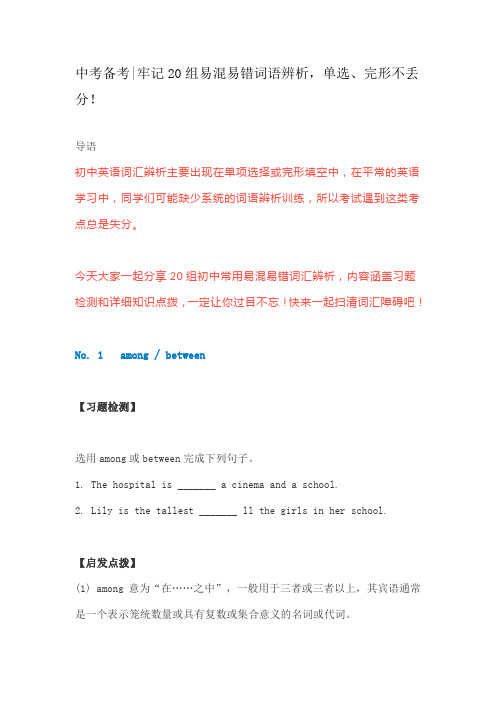
中考备考|牢记20组易混易错词语辨析,单选、完形不丢分!导语初中英语词汇辨析主要出现在单项选择或完形填空中,在平常的英语学习中,同学们可能缺少系统的词语辨析训练,所以考试遇到这类考点总是失分。
今天大家一起分享20组初中常用易混易错词汇辨析,内容涵盖习题检测和详细知识点拨,一定让你过目不忘!快来一起扫清词汇障碍吧!No. 1 among / between【习题检测】选用among或between完成下列句子。
1. The hospital is _______ a cinema and a school.2. Lily is the tallest _______ ll the girls in her school.【启发点拨】(1) among意为“在……之中”,一般用于三者或三者以上,其宾语通常是一个表示笼统数量或具有复数或集合意义的名词或代词。
(2) between一般指两者之间,其宾语通常是表示两者概念的名词或代词,或由and连接的两个具体的人或物。
between有时也可表示多者之中的“两两之间”。
如:Switzerland lies between France, Germany, Austria and Italy.Key:1. between2. amongNo. 2 lay / lie【习题检测】用lay或lie的适当形式完成句子。
1. I _______ the table when my mother cooked the meal.2. John was ill and _______ in bed all morning.【启发点拨】(1) lay作动词,可意为“摆放(餐桌)”,其过去式与过去分词均为laid,现在分词为laying,常用于短语lay the table,意为“摆放餐桌”。
如:Tom was laying the table.(2) lie作动词,意为“躺;平躺”时,过去式为lay,过去分词为lain,现在分词为lying。

初中英语老师:中考英语易错知识点专练:连词(含答案和解析)初中英语老师:中考英语易错知识点专练:连词(含答案和解析)连词除了用于连接单词与单词、短语与短语,还主要用于并列句和主从复合句,初中阶段,关于从句,我们主要学习状语从句和宾语从句。
今天我们就一起来看看中考英语是怎样对连词进行考查的以及易错点在哪里~(本账号由三好网发起并运营)易错知识点清单1. as,while,whenas用作连词时,含义比较多:A)引导时间状语从句。
(1)用“as soon as”结构,意思是“一……就”。
例如:Please e-mail me as soon as you get there.请你一到那里就给我发电子邮件。
I’ll tell him the news as soon as he comes back.他一回来我就把这个消息告诉他。
(2)作“与……同时、一边……一边、当……的时候”讲时,强调主从句的动作同时发生,而从句的谓语动词必须是延续性动词。
例如:He read the letter as he walked along the river.他一边沿着河边走,一边读信。
As I waited at the stop, I heard a big noise.我在车站候车的时候,听到了一声巨响。
B)引导比较状语从句。
用于“as...as”结构中,第一个as是副词,第二个as 是连词。
否定句用not as/so...as结构。
例如:He sings as well as his brother.他唱歌和哥哥一样好。
Canoeing is not as/so interesting as sailing.划独木舟没有航海有趣。
C)引导原因状语从句。
表示明显的原因,意思是“由于、鉴于”。
例如:We all like her as she is kind.我们都喜欢她,因为她善良。
As you’re tired, you’d better have a rest.因为你疲劳,你最好休息一下。

数词易错清单1. 确数和约数(1)当我们说“几百”、“几千”这样一些确数时,“百”、“千”是不能用复数形式的。
结构是:数词+hundred/thousand/million/billion+名词复数如:five hundred五百;three thousand三千;two million两百万;six billion六十亿。
(2)当hundred,thousand,million加上s后,它们就成了概数,表示“数百”、“数千”、“数百万”等概念。
而且通常接of,表示“成百的”,“数以千计的”,“成千上万的”,“亿万的”等。
结构是:hundreds/thousands/millions/billions+of+名词复数。
如:hundreds of new tall buildings数以百计的新高楼;thousands of students数以千计的学生;millions of people数以百万计的人。
2. 数词和冠词的关系(1)一般情况下,序数词前要加定冠词the,但基数词前不加冠词。
如:He failed in the first try. 他第一次尝试失败了。
My number is forty-nine.我的号码是49。
(2)a/an+序数词,表示“又一、再一”。
如:The monkey ate a second banana.这只小猴又吃了一根香蕉。
(3)of the+基数词,表示“范围”。
如:You can choose a toy of the two as a birthday present.你可以在这两个玩具中选一个作为生日礼物。
3. “数词+more”与“another+数词”(1) 表“另外的”接复数名词,如与具体数词连用,则置于数词之后,但与定冠词the连用时,other要放在数词前。
如:Mr Smith asked me to fetch another three CDs.史密斯先生让我再拿三张CD。

中考英语语法易错易混知识点一、可数名词与不可数名词1.可数名词表示能够用数目表示的名词,常常可以用单数或复数形式来表示,其前可以加"a"或"an"。
例句:I have a book.(单数)/ I have two books.(复数)2.不可数名词表示不能用数目清楚地表示的名词,只能用单数形式,前面不能加"a"或"an"。
例句:I have some milk.(不可数名词)二、形容词与副词1.形容词修饰名词,用来描述或限定名词。
形容词通常放在名词的前面。
例句:She is a beautiful girl.2.副词用来修饰动词、形容词或其他副词,通常放在被修饰词的后面。
例句:He runs fast.三、一般现在时与现在进行时1.一般现在时表示经常性或习惯性的动作,叙述真理或客观事实。
例句:The sun rises in the east.(真理)/ He often plays soccer on weekends.(习惯性动作)2.现在进行时表示现在正在进行的动作。
例句:I am watching TV now.(正在进行的动作)四、一般过去时与过去进行时1.一般过去时表示已经结束的过去的动作。
例句:I finished my homework yesterday.(过去的动作已经完成)2.过去进行时表示过去其中一时刻正在进行的动作。
例句:They were playing basketball at 7 o'clock yesterday evening.(过去其中一时刻正在进行的动作)五、定冠词与不定冠词1.定冠词"the"用来特指已经提到过或可唯一确定的名词。
例句:I saw the boy in the park.(特指已经提到的男孩)2.不定冠词"a"或"an"用来表示泛指或不特指的名词。
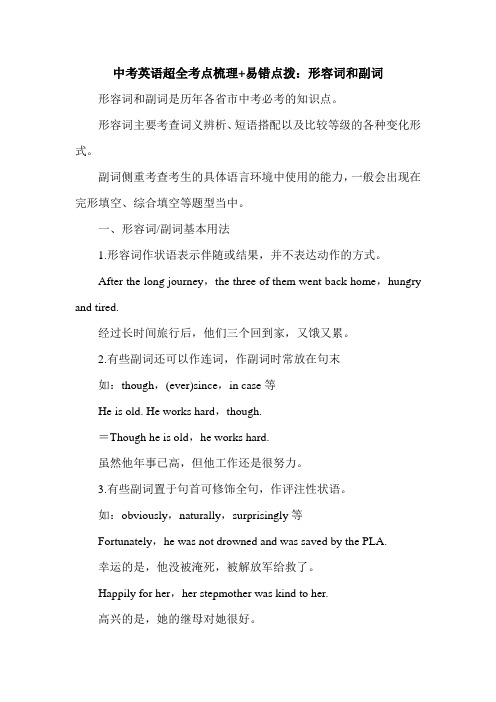
中考英语超全考点梳理+易错点拨:形容词和副词形容词和副词是历年各省市中考必考的知识点。
形容词主要考查词义辨析、短语搭配以及比较等级的各种变化形式。
副词侧重考查考生的具体语言环境中使用的能力,一般会出现在完形填空、综合填空等题型当中。
一、形容词/副词基本用法1.形容词作状语表示伴随或结果,并不表达动作的方式。
After the long journey,the three of them went back home,hungry and tired.经过长时间旅行后,他们三个回到家,又饿又累。
2.有些副词还可以作连词,作副词时常放在句末如:though,(ever)since,in case等He is old. He works hard,though.=Though he is old,he works hard.虽然他年事已高,但他工作还是很努力。
3.有些副词置于句首可修饰全句,作评注性状语。
如:obviously,naturally,surprisingly等Fortunately,he was not drowned and was saved by the PLA.幸运的是,他没被淹死,被解放军给救了。
Happily for her,her stepmother was kind to her.高兴的是,她的继母对她很好。
4.can not/never 与enough 或too连用表示:无论怎样都不过分;越……越好。
—I was riding alone in the street and all of a sudden,a car cut in and knocked me down.——我正在大街上独自一人骑自行车,突然一辆小汽车强行超车把我撞倒了。
—You can never be too careful in the street.——在大街上你越小心越好。
二、形容词/副词的比较级和最高级1."as+形容词+(a/an)+名词+as"表示同级比较,注意中间的形容词和名词并列时各自所在的位置。
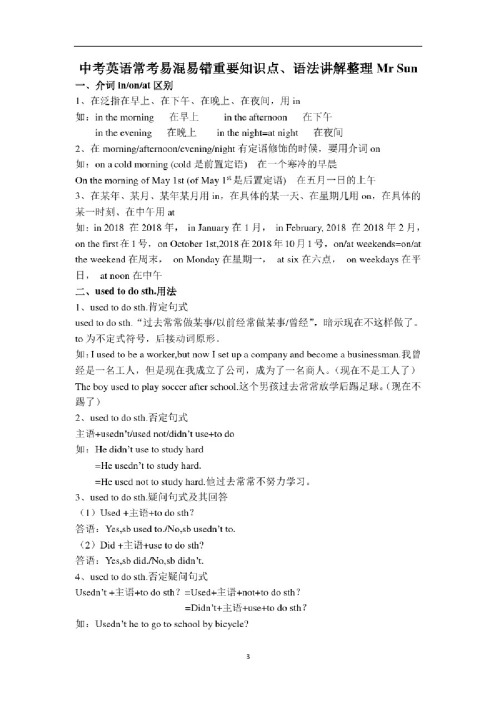
中考英语常考易混易错重要知识点、语法讲解整理Mr Sun一、介词in/on/at区别1、在泛指在早上、在下午、在晚上、在夜间,用in如:in the morning在早上in the afternoon在下午in the evening在晚上in the night二at night在夜间2、在morning/afternoon/evening/night有定语修饰的时候,要用介词on如:on a cold morning(cold是前置定语)在一个寒冷的早晨On the morning of May1st(of May1"是后置定语)在五月一日的上午3、在某年、某月、某年某月用in,在具体的某一天、在星期儿用。
n,在具体的某一时刻、在中午用at如:in2018在2018年,in January在1月,in February,2018在2018年2月,on the first在1 号,on October1st,2018在2018年10月1号,on/at weekends=on/at the weekend在周末,on Monday在星期一,at six在六点,on weekdays在平日,at noon在中午二、used to do sth.用法1、used to do sth.肯定句式used to do sth.“过去常常做某事/以前经常做某事/曾经”,暗示现在不这样做了。
to为不定式符号,后接动词原形。
如:I used to be a worker,but now I set up a company and become a businessman.It曾经是一名工人,但是现在我成立了公司,成为了一名商人。
(现在不是工人了)The boy used to play soccer after school.这个男孩过去常常放学后踢足球。
(现在不踢了)2、used to do sth.否定句式iin+usedift/used not/didn't use+to do如:He didn't use to study luird=He usedn't to study hard.=He used not to study hard.他过去常常不努力学习。

2024年上海中考英语冲刺:易错知识点&易错题【冠词和介词词组总结】1.in such ______hurry2._____a low voice3.be frightened _____4.not as much money as5.share sth_____sb6._____the left7.___ no time=immediately8.be based _______9.be responsible ____10.____one’s thirties11.take_____look at12.pay____WeChat13.provide sb__sth14.offer sth___sb12.___worry on one’s face16.make____living17.____present18.______oneself19.give _______20.keep_____diary21.play tricks______22.person ____red23.there is something wrong___24.make____progress【非谓语动词】(以do的适当形式填空)1.avoid_______2.ask sb________3.practice ________4.expect sb _____=hope (that) sb _____5.admit_______6.by__________7、spend time ______8.keep_______9.allow _______10.allow sb______11.had better _______(not)12.manage _____13.decide_______14.enjoy _______15._____waterfall(freeze)16._____(freeze)weather17.stop sb from______【不可数名词】1.some air2.much information3.a lot of beef4. much advice5.a lot of furniture6.some information7.much funtest news9.weather【以ly结尾的形容词】1.friendly2. lovely3.lonely4.likely5.daily(也可做副词)6.elderly7.lonely【疑问词】1.提问词:How far回答:about twenty minutes’ walk 2.提问词:How often回答:once a week 、every other day3.提问词:How回答:with the help of the map 4.提问词:How long 回答:1)for one year2)Since 20155.提问词:How soon?回答:in five weeksIn five days6.提问词:Why回答:in order to doto do【形容词的发音】(选填a/an)1.____exhausting day2.__useful suggestion3.what _____pity4._____European palace5._____unique day6._____usual day7.____unusual day8.____oneeyed person【情景问答】1、you are wele1)Thanks very much for your help.2)Can I join you? 2、good idea1)Shall we join in the......?2)I think we should raise some money for....3、That’s all right4、not at all1)would you mind me doing ......5、It doesn’t matter1)I am sorry to interrupt you 6.No problem1)Can you help me withe the luggage?7.sure,I’d love to1)Would you like to join us?8.Okay,anytime1)Would you e and pick me up?9.What’s the matter?1)I can’t attend tomorrow’s speech.10.Never mind.1)I am really sorry ...【题干中出现的罕见词】bel2.unique3.thanks to...4.luggage5.heavy traffic 6 fort7.daily routine8.include9.refer to【不规则动词】2、plan_________________ 3.rise________________ 1、fall_______________区别:feel_______________4.wake_______________5.sink________________【比较级的修饰词】形容词/副词比较级、最高级1.even more important2.much younger3.much heavier4.far/still/a bit/a lot+比较级【反义疑问句中出现的否定词】1.hardly2.seldom3.rarely4.few5.little6.never【同义句】1、so...that/...enough to do..../too...to do...1)The suitcase was too heavy for her to lift.(保持句意基本不变)The suitcase was _______ heavy _______ she couldn’t lift it.2)Jack ran so fast that he caught the early train to the city.(保持句意基本不变)Jack ran_________ _________to catch the early train to the city3) I was too frightened to think clearly after I heard a terrible sound. (保持句意基本不变)I was ________ frightened ________ I could hardly think clearly after I heard a terrible sound.2、同义短语:delay =put off 推迟1)The school sports meeting was delayed because of the bad weather. (保持句意基本不变)The school sports meeting was ________ ________ because of the bad weather.3、sb spend sometime doing sth =It takes sb sometime to do sth1)We spent a whole month reviewing all the subjects before the examination. (保持句意基本不变)It ________ us a whole month to ________ all the subjects before the examination.4、like A better than B =Prefer A to B1)The kids like their friends’ plan for the party better than their parents’.(保持句意基本不变)The kids________ their friends’ plan for the party ________ their parents’.5、start doing sth=take up doing sth1)Would you like to start a new hobby when you go to another country? (保持句意基本不变)Would you like to ________ ________ a new hobby when you go to another country?6、have no idea about...=don’t know about...1). Max had no idea about how to choose a pair of fortable shoes.(保持句意基本不变)Max ________ ________about how to choose a pair of fortable shoes.7、where+从句=where to do ...1)Could you tell me where I can exchange money for travelling abroad?(改为简单句)Could you tell me__________ __________exchange money for travelling abroad?【连词成句中出现的特殊句式】1.find n./pron.+adj./n.+to do sth 用在作文中I find it great fun to achieve something through hard work.2、be sure that+从句肯定......People were sure that the detective could find out the truth.3、动名词作主语Eating too much chocolate is bad for our teeth.4、It is a good idea to do...It is a good idea to listen to light music before bedtime.5、It takes sb sometime to do sthIt took Kitty a lot of time to do word puzzles last summer holiday.【并列句翻译】or否则......1、We need to do something soon,or the problem will get worse.2、Remember to book a ticket online ahead, or you will have to queue up for getting on.3、Just leave the key to the exercises behind,or you will be dependent on it.but虽然......,但是......1、I have already asked him twice, but he hasn’t given me any reply.2、Tina bought lots of interesting books, but she didn’t have time to read them.3、“I’d like to go to the concert with you tonight, _________ I’m too busy.” Ann said to me.4、I knew it was only a model, but it looked very real.【状语从句翻译】so that ... 为了....结果....这样的话....1、We decided to see the town on a guided tour so that someone would show us the sights.2、We should arrive at the airport two hours earlier so that we can have enough time to checkwhile 当....在;在...同时在....1、Tony was drawing a picture while I was doing my homework at that time.for conj.因为......1、We had to wait outside, for all the seats in the shop were taken already.though 虽然...,但是......1、The old man still coughs a lot though he has taken some medicine for a couple of days.2、Though they followed the map, they couldn’t find the small village easily.because 因为......,所以......1、Lisa doesn't like watching TV programs because there are too many ads.2、The Blacks are not going on holiday this year, mainly because they can’t afford it.Unless 除非......,(否则)......Sandy usually sleeps with the window open ________ it’s really cold.【易错题】1、Our decision ___ for some drink made us late for the train.A. stopB. to stopC. stoppingD. to stopping2、As a result of the bloods, six people died and thousands were made _______.(home)3、A good travel agent knows that a _______ customer will always e back.(satisfying)4、She felt very happy when she heard Victor’s voice on the line.(保持句意基本不变)_______ _______ great joy, she heard Victor’s voice on the line.I was surprised to see my sister’s photograph on a magazine cover. (保持句意基本不变)_________ my _________ , I saw my sister’s photograph on a magazine cover.5、Jack looked _________ at his report. He failed in the maths exam again.A. lovelyB. friendlyC. sadlyD. lonely6、Mountainclimbing is an _________ activity for young people during holidays. (enjoy)7、All of us know that Thomas Edison was a great _________ of electric lights. (invent)8、Sometimes we can get so much pleasure from the _________ knowledge. (useful )9、There are a lot of beautiful trees and flowers along the street nowadays. (改为一般疑问句)_________ there _________ beautiful trees and flowers along the street nowadays?10、Dad has brought us a surprise piece of news. (改为感叹句)_________ _________ surprise piece of news Dad has brought us!11、You cannot watch TV tonight unless you have done your homework. (保持句意基本不变)You cannot watch TV tonight _________ you _________ done your homework.12、At first, he didn’t know what to do in the new group. (改为复合句)At first, he didn’t know what _________ _________ do in the new group.13、–Would you like me to lock the door for you?_________.A.Yes, I’d like toB. It’s a pleasureC.Yes, pleaseD. It doesn’t matter14、We learned about the life of the famous_________ from this film. (invent)15、________ 800word paper on the desk doesn’t belong to me. It is my friend Amy’s.A. AB. AnC. TheD. /16、Tim rushed into his room, with a cup in one hand and some books in his ________ hand.A. anotherB. the otherC. othersD. other17、Mum looked ________ at Mary’s school report because she made great progress this term.A. happyB. happilyC. sadD. sadly18、Please tell Daisy to call me when she________ back to Shanghai tomorrow afternoon.A. esB. cameC. will eD. have e19、The good news our basketball team has won a game spread fast in our school, ________ it?A. don’tB. didn’tC. won’tD. hasn’t20、Going to climb mountain alone has been a dream of ________ since she was young. (she)21、Tony is a/an ________ boy, so few of his classmate wants to play with him. (honest)22、The doctor decided to ________ Tim’s brain at once to see if there was something wrong. (exam)23、The old couple took the map of the world with_________ for a longtime journey.A. themB. theirC. theirsD.themselves24、_________ unique dinner we've had in the famous hotpot restaurant!A. WhatB. What aC. What anD. How25、You will not achieve your goal unless you_________ hard without stop.A. workB. are workingC. have workedD. will work26、The delivery fee should be paid according to the_________ of the package (weigh)27、The new technology helps enrich book_________ in local libraries.(collect)28.After years of practice, the new traffic rules are_________ accepted by local people.(wide)29. Jenny designed the school decoration again. She didn’t make a plaint.(保持句意基本相向)Jenny designed the school decoration again_________ _________a plaint.30.Burry often introduces interesting books to his students so as to ________their minds.(wide)31.Some developing countries are in great need of ________ care for children. (medicine)32.Zak was ________ hurt in the car accident because of the driver’s carelessness. (serious)33. They say it’s an exciting puter game, but I have never played it _________. (my)34. If you don’t help________, I can’t finish the work in time.A. IB. myC. meD. mine35.With the effort of the government, we’ll have ________ reason to believe that the problem of airpollution will be solved.A. someB. everyC. eachD. other36.The sense of ________ helps us keep our balance so that we do not fall down.A. sightB. smellingC. hearingD. direction37. The ________ kids learn to be independent, the better it is for their future. (early)38.Sue ________ dancing for eight years when she won the first place in the talent show.A. learnsB. learntC. has learntD. had learnt39. Jill,let’s make some special gifts for our mother’s birthday, ________?A. shall weB. will youC. do youD. will we40. The government has made a ________to set up a new middle school in our district.(decide)41. There are many farmer ________ in Fengjing Town, Jinshan. (art)42.Which of the following underlined parts is different in pronunciation from the others?A. breathB. headC. deathD. beach43.Mary read the English text twice last night. (改为反义疑问句)Mary read the English text twice last night,__________ __________?44.Jackson had_________ simple breakfast and left hotel early in the morning.A. aB. anC. theD./45.The salesman showed her several bags and she chose_________ one as she didn’t want to spend too much money on it.A. less expensiveB. more expensiveC. the least expensiveD. the more expensive46. Mrs .Green looked_________ at her son, feeling sorry for not telling him the truth.A. sadB. sadlyC. happyD. happily47.Jerry used to be poor at English._________ He has made in learning English now!A. What a great progressB. What great progressC. How great a progressD. How great progress48. Linda, please put the book back on the bookshelf, _________?A. do youB. will youC. doesn’t sheD. shall we49.Tina's mother bought her a nice dress yesterday, and now she is dressing_________ . (she)50. Many people believe that it is_________ to ask about a woman's age.(polite)51. Tom needed an_________ on his right leg after the traffic accident, (operate)52. The earthquake_________ destroyed the old buildings in this area, (plete)53. Although the medical treatment has proved to be_________ , the patient hasn't given up yet. (use)54. They didn’t tell me about the terrible accident happened this morning.(改为被动语态)I_________ _________about the terrible accident happened this morning.55.We hope that we will get the first prize in the ing speech contest.(改为简单句)Our hope is_________ the first prize in the ing speech contest.。
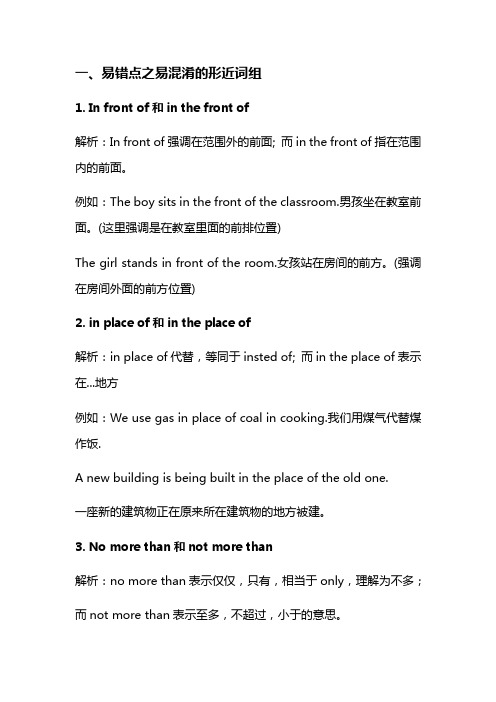
一、易错点之易混淆的形近词组1.In front of和in the front of解析:In front of强调在范围外的前面; 而in the front of指在范围内的前面。
例如:The boy sits in the front of the classroom.男孩坐在教室前面。
(这里强调是在教室里面的前排位置)The girl stands in front of the room.女孩站在房间的前方。
(强调在房间外面的前方位置)2.in place of和in the place of解析:in place of代替,等同于insted of; 而in the place of表示在...地方例如:We use gas in place of coal in cooking.我们用煤气代替煤作饭.A new building is being built in the place of the old one.一座新的建筑物正在原来所在建筑物的地方被建。
3.No more than和not more than解析:no more than表示仅仅,只有,相当于only,理解为不多;而not more than表示至多,不超过,小于的意思。
例如:He is no more than an ordinary English teacher. 他只不过是个普通的英文老师。
He has not more than three children. 他最多3 个孩子(有或许还不到三个)4.On earth和on the earth解析:两者都有在地上,在地球上的意思,但on earth还有到底,究竟的意思;On the earth只是单纯的表示在地上,在地球上例如:where on earth did you spring from?你究竟从哪里冒出来的?What if there was no lead on the earth at all?如果地球上根本就没有铅这种物质怎么办?5.At all和after all解析:at all表示根本,全然的意思,常用短语not at all表示一点也不;after all表示到底,毕竟的意思例如:I don't know him at all. 我根本不认识他。
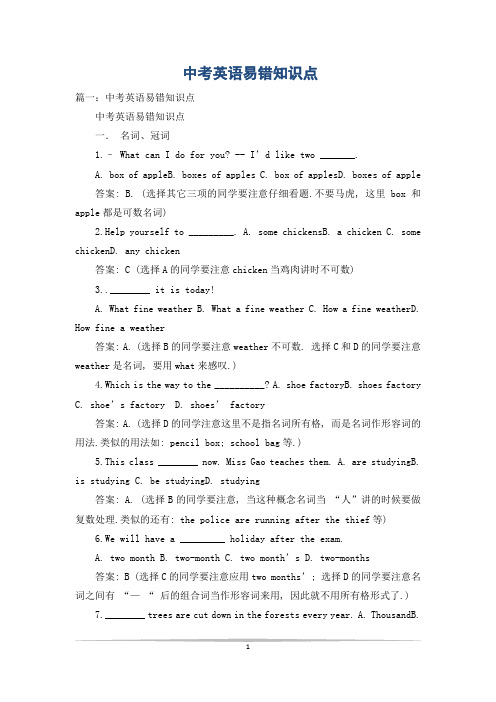
中考英语易错知识点篇一:中考英语易错知识点中考英语易错知识点一.名词、冠词1.– What can I do for you? -- I’d like two _______.A. box of appleB. boxes of applesC. box of applesD. boxes of apple答案: B. (选择其它三项的同学要注意仔细看题.不要马虎, 这里box 和apple都是可数名词)2.Help yourself to _________. A. some chickensB. a chicken C. some chickenD. any chicken答案: C (选择A的同学要注意chicken当鸡肉讲时不可数)3..________ it is today!A. What fine weatherB. What a fine weatherC. How a fine weatherD. How fine a weather答案: A. (选择B的同学要注意weather不可数. 选择C和D的同学要注意weather是名词, 要用what来感叹.)4.Which is the way to the __________? A. shoe factoryB. shoes factoryC. shoe’s factoryD. shoes’ factory答案: A. (选择D的同学注意这里不是指名词所有格, 而是名词作形容词的用法.类似的用法如: pencil box; school bag等.)5.This class ________ now. Miss Gao teaches them. A. are studyingB. is studying C. be studyingD. studying答案: A. (选择B的同学要注意, 当这种概念名词当“人”讲的时候要做复数处理.类似的还有: the police are running after the thief等)6.We will have a _________ holiday after the exam.A. two monthB. two-monthC. two month’sD. two-months答案: B (选择C的同学要注意应用two months’; 选择D的同学要注意名词之间有“—“ 后的组合词当作形容词来用, 因此就不用所有格形式了.) 7.________ trees are cut down in the forests every year. A. ThousandB.ThousandsC. Thousand ofD. Thousands of答案: D. (选择C的同学注意词组记忆的准确性)8.Our sports meeting will be held ________.A. on 24, Tuesday, AprilB. in April 24, TuesdayC. on Tuesday, April 24D. in April Tuesday 249_________ people here are very friendly to us. A. The B. / C. A D. An答案: A. (选择B的同学要注意这里的people是特指这里的, 因此要用定冠词the)10..There is no enough ________ in the corner to put the table.A. placeB. roomC. floorD. ground答案:B (根据句意知道,这里表示没有地方放桌子。

中考英语语法单选易错题复习一:单选知识点剖析:语音:1.Which of the following underlined parts is different in pronunciation from others?A. Tom needs some information for his project.B. I have many questions to ask you.C. His situation is even worse than before.D. Cars are a major source of pollution.【正确答案】……B【题目解析】……ACD发/ ʃ(ə)n /,B发/ tʃ(ə)n /。
2. Which of the following words is pronounced /sed/ ?A) seed B) sad C) said D) side 【正确答案】B【题目解析】A [si:d] B [sæd] C [sed] D [saɪd]冠词:1.A comic strip is usually about ________interesting story with an unforgettable end.A. aB. anC. theD. /【正确答案】……B【题目解析】……元音音素前用不定冠词an2.The boy was knocked down by a car and now is in _______hospital.A. aB. anC. theD. /【正确答案】……D【题目解析】……in hospital 生病住院3.________ young man living next door wants to be a detective in the future.A. AB. AnC. TheD. /【正确答案】C【题目解析】特指,选the,指住在隔壁的男孩介词:1. Hurry up, Christopher! The train is leaving _______ less than ten minutes.A) at B) in C) for D) of 【正确答案】B【题目解析】,进行时表将来时,in+一段时间主句用将来时态代词:1. Alice was shown around London by a friend of _________ yesterday.A. sheB. herC. hersD. herself 【正确答案】C【题目解析】双重所有格a friend of hers2.- How soon will you leave?- I’m not sure, probably in _____ ten minutes.A. anotherB. otherC. the otherD. others【正确答案】……A【题目解析】……another ten minutes = ten more minutes名词的数:1. During he stay in America, he gained much _____ of local customs and cultures.A. adviceB. knowledgeC. ideaD. message【正确答案】……B【题目解析】……knowledge of 对……有了解2. The party planner prepared _______games for the gusts to enjoy themselves at the party.A) a large sum of B) a huge amount of C) a great number of D) a great deal of 【正确答案】C【题目解析】ABD都是修饰不可数名词,只有c是修饰可数名词。

中考英语易错知识点一、时态与语态1. 一般现在时与现在进行时的混淆- 易错点:描述经常发生的动作或状态时误用现在进行时。
- 正确使用:一般现在时用于习惯性动作或普遍真理,现在进行时用于正在进行的动作。
2. 过去完成时的误用- 易错点:在没有明确过去时间点参照的情况下使用过去完成时。
- 正确使用:过去完成时表示在过去某个时间点之前已经完成的动作。
3. 被动语态的不正确使用- 易错点:在应强调行动承受者而非执行者时错误地使用主动语态。
- 正确使用:被动语态用于强调受动作影响的对象。
二、词性与词形1. 名词的单复数形式- 易错点:对于不规则变化的名词复数形式记忆不清。
- 正确使用:注意名词复数形式的变化规则,包括不规则变化和特殊名词。
2. 动词的不规则变化- 易错点:在使用过去式和过去分词时,错误地使用规则变化。
- 正确使用:掌握不规则动词的过去式和过去分词形式。
3. 形容词与副词的混淆- 易错点:在需要使用副词修饰动词时错误地使用形容词。
- 正确使用:形容词用于修饰名词,副词用于修饰动词、形容词或其他副词。
三、句型结构1. 条件句的使用- 易错点:在表达假设或条件时混淆不同类型的条件句。
- 正确使用:区分真实条件句(使用if或when)和虚拟条件句(使用if或were)。
2. 宾语从句的语序- 易错点:在宾语从句中错误地使用倒装语序。
- 正确使用:宾语从句应使用陈述句语序。
3. 定语从句的关系词- 易错点:在选择关系代词或关系副词时出错。
- 正确使用:根据先行词的指代内容和在从句中的作用选择合适的关系词。
四、词汇用法1. 同义词和近义词的区分- 易错点:在特定语境中错误地替换同义词。
- 正确使用:理解每个词汇的微妙差别和适用语境。
2. 短语动词的理解- 易错点:对短语动词的意思和用法理解不足。
- 正确使用:熟悉常用短语动词的构成和意义。
3. 介词的搭配- 易错点:在选择介词时忽视其固定搭配。
- 正确使用:掌握介词与名词、动词的固定搭配。

初中英语语法错误总结
英语作为一门国际通用语言,对于研究者而言,语法的正确运
用非常重要。
以下是初中生在英语研究中常犯的语法错误总结:
1.主谓不一致
主语和谓语在数上不一致是英语中很常见的错误。
正确的主谓
一致应该是指主语和谓语在人称(第一人称、第二人称、第三人称)和数(单数和复数)方面应该相同。
例如,“He study hard”应该改
为“He studies hard”。
2.动词时态错误
动词的时态错误也是常犯错误。
时态是指动词所表示的动作或
状态在时间上的表现形式。
例如,“I have my breakfast this morning”应该改为“I had my breakfast this morning”。
3.代词误用
代词的误用也非常常见。
例如,“Mary and me like the same thing”应该改为“Mary and I like the same thing”。
4.冠词误用
冠词是名词前的限定词,包括定冠词“the”和不定冠词“a/an”,
误用也较为普遍。
例如,“I saw a elephant in the zoo”应该改为“I saw an ele phant in the zoo”。
5.单词拼写错误
拼写错误对于初学者来说也是常见的错误。
很多单词拼写相似,很难区别。
例如,“desert”和“dessert”、“their”和“there”等。
通过对以上几个方面的总结,相信大家能够更好的避免这些常
见的语法错误,更好地掌握英语的语法知识。

中考英语知识点:从句时态的考查点
中考英语知识点:从句时态的考查点
1. 如果主句是一般现在时、一般将来时或祈使句时,宾语从句的时态不受限制,可以根据实际表达的需要来确定。
如:Could you tell me what he said at the meeting?
你能告诉我他在会上说什么。
He will tell us that he has been able to look after himself.
他会告诉我们他已经能告诉他自己。
Tell him when we will finish our work.
告诉他我们什么时候完成工作。
2.【考查点】如果主句是过去的某种时态,宾语从句应与主句保持一致,用过去的某种时态。
如:He said that he was born in Wenzhou in 1996.
他说他1996年出生于温州。
They said that they had already seen the film.
他们说他们已经看过这部电影了。
3.【易错点】如果宾语从句所叙述的是客观事实、格言、科学真理时,从句时态不受主句限制,用一般现在时。
如:Everyone knew there are 365 days in a year.
大家都知道一年有365天。
She said that two heads are better than one.
她说三个臭皮匠顶个诸葛亮。
He said that the sun rises in the east.
相关推荐:中考英语知识点:宾语从句的连接词的用法。
![[精]中考英语易错知识点辨析丨并列句和复合句](https://img.taocdn.com/s1/m/9ef2fcb43169a4517623a348.png)
中考英语易错知识点辨析丨并列句和复合句1.when,if引导的时间状语从句和宾语从句1.含有when,if引导的时间状语从句的复合句中,若主句是一般将来时,从句应用一般现在时;when引导其他时态的时间状语从句时,从句时态应与主句时态保持一致。
2. when, if引导的宾语从句,首先要保证从句的陈述语序,然后再根据主句的时态确定从句时态,使其基本与主句内容保持意义上的一致。
if充当宾语从句的连接词时,相当于whether, 词义为“是否”;充当状语从句的连接词时,词义为“如果”。
when充当宾语从句的连接词时,意为“什么时候”;充当状语从句的连接词时,意为“当……的时候”。
如:I don't know when my father will come back, but I'll ask him to call you back when he comes back.我不知道我爸爸什么时候回来,但是他回来的时候我可以让他给你回电话。
I don't know if he will come back. If he comes back, I'll tell you.我不知道他是否会回来。
如果他回来的话,我会告诉你。
2.when, while,as的区别when, while, as引导的时间状语从句都可以使用延续性动词。
when, as都可以与终止性动词连用,而while则不能。
如:He fell asleep when(while, as) he was reading.他看书时睡着了。
when可表示瞬间、时间段,与主句所叙述的动作、事情可同时发生,也可有先后。
I will go home when he comes back.他回来时,我就回家去。
It was raining hard when we arrived.我们到达时正下着大雨。
while用于同时进行的两个延续性动词相伴随而发生,常对主从句中谓语的两个动作进行比较。

专题16 8BU8单元话题 A green worldReading 重点词汇、词组和句型Grammar 一般将来时的被动语态知识点囊括一、重点词组、句型1.对…认真be serious about sth一个严重的问题 a serious problem 伤得严重be seriously hurt2.我们不可以砍树,要不然,我们会被惩罚。
We aren’t allowed to cut down trees.Otherwise, we’llbe punished.允许某人做某事allow sb to do某人被允许做某事sb be allowed to do因…被惩罚be punished for sth3.如果我们在公共场所扔垃圾,我们会被警察罚款。
If we drop litter in a public place, we will be fined by the police.被罚款be fined4.我们依赖丰富的资源生活。
We depend on its rich resources依靠,依赖depend on …—What a day!It’s a raining again.—You cannot __C___ the fine weather when you plan a day out at this time of year.A.look forB.lead toC.depend onD.carry on5.这些新能源成本低廉且用之不尽。
These new types of energy cost very little and will never runout.用完,耗尽run out (无被动)对…有影响,起作用make a difference to sth6.它们产生很好的污染。
They produce little pollution.7.他们如何处理旧衣服呢?What do they do with old clothes?如何处理sth what… do with sth8.我们应该进行垃圾分类这样它才能被循环使用。
中考英语易错知识点3..________ it is today!A. What fine weatherB. What a fine weatherC. How a fine weatherD. How fine a weather答案: A. (选择B的同学要注意weather不可数. 选择C和D的同学要注意weather是名词, 要用what来感叹.)8.Our sports meeting will be held ________.A. on 24, Tuesday, AprilB. in April 24, TuesdayC. on Tuesday, April 24D. in April Tuesday 24答案: C. (选B的同学是受到中文的影响,要特别注意中英文的差异)13.– When shall we meet again next week?-- _______ day is possible. It’s no problem with me.A. EitherB. NeitherC. EveryD. Any答案: D. (选择C的同学要注意every指的是每一天都见面, any指的是任何一天都可以.注意中文的干扰)16.Robert has gone to _________ city and he’ll be back in a week.A. otherB. the otherC. anotherD. any other答案:C(选择其它三项的同学要注意,这里没有说只有两座城市,因此不能用.)20.– What do your parents do?-- One is a teacher; _________ is a driver.A. otherB. anotherC. the otherD. that one答案: C (选择其它三个选项的同学要注意, one is …, the other is …的用法)21.Mrs. Lee teaches ________ math. We all like her.A. weB. usC. ourD. ours答案: B (选择C的同学要注意, teach +人+科目, 而不能用teach +某人的+ 科目)22.There are many trees on ________ side of the street.A. eitherB. anyC. allD. both答案:A (选择D的同学要注意side为单数。
选择B的同学要注意:街道只有两边,因此不能用any)23.________ is the population of the city?A. How manyB. WhatC. How many peopleD. How much答案:B (在问到人口是多少时,其实是在说“人口数是什么”,因此不能用A,要注意排除中文的干扰。
)27.He hasn’t heard from his friend __________ last month.A. sinceB. by the end ofC. forD. until答案: A (选择B的同学要注意B选项为过去完成时的时间; 选择C的同学要注意, for+时间段; 选择D的同学要注意不是not…until 句型.until+ 句子)29.I’m going to look for another job ________ the company offers me more money.A. afterB. unlessC. whenD. for答案: B ( 选择其它三项的同学要注意语境, 这里是指除非公司给我更多工资,否则我就要找其它工作.)3 33.I wonder ________ they finished so many different jobs in such a short time.A. whyB. howC. whenD. where答案:B(选择A的同学要注意语境,这里指他们怎么能在如此短的时间里完成如此多的困难的工作.)34.-- Do you speak English?-- Yes, I speak _________ a little English _______ some French.A. neither, notB. both, orC. either, orD. not only, but also答案:D(选择C的同学要注意语境.)四、动词部分42..It’s spring now. The students ________ trees these weeks.A. plantB. are plantingC. will plantD. planted答案: B (选择A的同学要注意these weeks 并不表示经常做某事,而是强调这几个星期同学们一直在种树.)45..Though it’s cloudy now, it _________ get sunny later.A. canB. mayC. mustD. need答案: B ( 选C的同学要注意语境, 这里强调过些时候也许会晴天, 表示推测性.)46.It is in the library, you _______ talk loudly.A. may notB. can’tC. needn’tD. mustn’t答案: D ( 选择B的同学要注意中文的干扰.can’t表示不能够。
)47..If anyone wants to say something in class, you ________ put up your hands first.A. mustB. mayC. shouldD. can答案: A ( 选其他三个选项的同学要注意语境,anyone暗示出语气。
表明是一个规定,而不是建议。
)50..He will call me as soon as he _________ the city.A. reachesB. reachedC. will reachD. is reaching答案:A(选择B的同学要注意主将从现)51.The pen _________ him ten yuan.A. paidB. costC. tookD. Spentcost的主语是物或某种活动,还可以表示"值",常见用法如下:(1)sth. costs (sb.) +金钱,某物花了(某人)多少钱。
例:A new computer costs a lot of money. 买一台新电脑要花一大笔钱。
(2) (doing) sth. costs (sb.) +时间,某物(做某事)花了(某人)多少时间。
例:Remembering these new words cost him a lot of time. 他花了大量时间才记住了这些单词。
答案:B(选择C的同学要注意took通常用在时间上;选择A和D的同学要注意,这里的主语是物品,因此不能用paid 和spent)53..– How many books _____ they ________?-- Five. But they haven’t finished reading even one.A. did…borrowB. had…borrowedC. will…borrowD. do…borrow答案:A(选择B的同学要注意,这里只是问过去发生的一件事,并不是过去时间之前发生的.)54.He _________ his bike so he has to walk there.A. lostB. has lostC. had lostD. loses答案:B(选择A的同学注意句子并没出现两个时间点,因此要注意时态的前后一致.)56.The population of the world in 20th century became very much _________ than that in 19th.A. biggerB. largerC. greaterD. more 答案: B.(选择其它三项的同学要注意population的固定搭配是large).)59.– Would you like ________ more tea?-- Thank you. I’ve had ________.A. any, muchB. some, enoughC. some, muchD. any, enough答案:C(选择B的同学要注意enough是形容词,不能说had enough)63.–What’s the weather like tomorrow?-- The radio says it is going to be even ______.A. badB. worstC. badlyD. worse答案:D(选择A的同学要注意,even+比较级)64.Though she talks ______, she has made ________ friends here.A. a little, a fewB. little, fewC. little, a fewD. few, a few答案:C(选择A的同学要注意语境,这里指虽然她不怎么说话,但她有一些朋友.)六、句法66..If it ________ tomorrow we’ll go to the park.A. will not rainB. doesn’t rainC. is not rainingD. didn’t rain答案: B (选择A的同学要注意if引导的条件状语从句主句用将来时, 从句用一般现在时.)67.The radio says the snow ______ late in the day.A. stopsB. will stopC. has stoppedD. stopped答案: B. (选择A的同学要注意语境, late in the day表示“晚些时候”, 要用将来时)71.– When are the Shutes leaving for New York?-- Pardon?-- I asked ___________.A.when are the Shutes leaving for New YorkB.when the Shutes are leaving for New YorkC.when were the Shutes leaving for New YorkD.when the Shutes were leaving for New York答案: D ( 选择B的同学注意到了宾语从句的语序,但同时要注意时态要用相应的过去时.)77.He hardly had anything to eat, ________ he?A. didn’tB. hadn’tC. hadD. did答案:D(选择A的同学要注意hardly表示否定;选择B 和C的同学要注意,反意疑问句要用助动词。